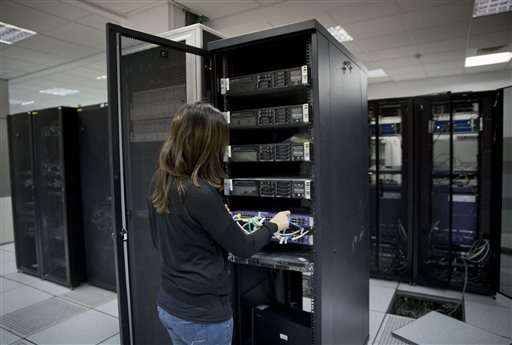After years of delays, Palestinians get high-speed mobile

Political science lecturer Amjad Abu el-Ez lived in London and Dubai for 17 years before returning home in 2014 to teach in the northern West Bank city of Nablus. He was stunned to learn he could barely check his email on the commute from his nearby village because Palestinian mobile carriers do not offer high-speed data.
"When I came here and I didn't find 3G, I felt cut off and insulted," el-Ez said. "This is something that has become a human right, like water, health and education. Why are we, the Palestinians, deprived of it?"
That could soon change. After years of delays, Israel said Thursday that it would allow the Palestinians to have their own 3G network, bringing relief to one of the last places in the world without mobile broadband services. The lack of high-speed access has been a source of frustration for young professionals, forcing many to seek creative solutions, sign up with Israeli carriers or scramble to find Wi-Fi networks.
Under interim peace accords, Israel controls wireless networks in the West Bank. The Palestinians are among 16 markets, including Cuba and Eritrea, that still use older 2G technology, according to the International Telecommunication Union, a U.N. agency.
The GSM Association, an industry group that represents mobile operators worldwide, says the newer technology can transmit as much as 62 times the amount of data per second. Without 3G, Palestinians cannot use Internet messaging services like Whatsapp, make Internet phone calls or watch streaming video, and even simple tasks such as sending email can be slow.
The Israeli decision came a week after Israeli Prime Minister Benjamin Netanyahu met with U.S. President Barack Obama in Washington in what was seen as an attempt to reset their famously frosty relationship.
At the meeting, Obama emphasized the need for generating momentum to restart peace efforts, more than a year and a half after talks collapsed. Amid a two-month wave of violence, Netanyahu indicated that he was considering several confidence-building measures to help ease the tensions. Giving the Palestinians access to 3G services seems to be the first move to come out of that meeting.
"We do not see the Palestinian people as animals," said Israeli government spokesman Mark Regev. "We continue to take steps to facilitate economic development and the overall well-being of the Palestinian population in the West Bank."
Cogat, the Israeli defense body responsible for Palestinian civilian affairs, announced the deal on Thursday. It said Cogat's commander, Maj. Gen. Yoav Mordechai, and Palestinian Minister of Civil Affairs Hussein al-Sheikh signed a memorandum of understanding "after examination by the security establishment."
Israel did not extend 3G frequencies to the Gaza Strip, which is controlled by the Islamic militant group Hamas.
The Palestinian telecommunications minister, Allam Mussa, said the agreement is a "great achievement for the Palestinian people."
"With having 3G, I expect a huge positive impact," Mussa told The Associated Press. "On the economy, investment, telecommunications, education, health—on every aspect of life."
Ammar Aker, executive chairman of the Palestinian Telecommunication Co., which runs the Jawwal mobile carrier, said he expected the 3G infrastructure to be ready within six to eight months. He said the move would open job opportunities and enable Palestinians to develop new mobile applications.
Until now, Palestinian developers had to create light applications for the slow network coverage. Most Palestinians, for instance, cannot use mobile GPS apps, in part because of the lack of high-speed access.
The lack of high-speed data in Palestinian areas stands in stark contrast with Israel, a tech-savvy country whose carriers have used 3G for a decade. In January, Israel auctioned off 4G mobile broadband radio frequencies to six Israeli carriers. The faster data will remain unavailable for Palestinian carriers.
Palestinians who choose to subscribe to an Israeli mobile carrier can access 3G. But coverage can be spotty, and they must often maintain a second Palestinian SIM card to communicate with friends and family to avoid expensive roaming fees between Israeli and Palestinian carriers. Palestinians, who seek to establish their own independent state, also bristle at being dependent on Israel for such a basic service.
The al-Shabaka think tank, a U.S.-based Palestinian research group, estimates that Israeli operators control as much as 40 percent of the Palestinian telecommunication market, reaping $80-$100 million a year, due to the lack of 3G.
Mashhour Abu Daqa, a former Palestinian telecommunications minister, said in past negotiations he was always told that the Israeli military was holding up approval of the 3G network on security grounds. But he believes Israeli carriers were behind the ban, trying to protect their interest in the captive Palestinian market.
"There is no security reason. Any Palestinian can get 3G through Israeli mobile phones, and second, all Palestinian mobile phones work through Israel in any case," he said.
Yechiel Shabi, spokesman for the Israeli Communications Ministry, said the delays were due to technical reasons, and that rearranging the wireless spectrum was a lengthy process. He said the Palestinian claim that Israel restricted 3G access for profit was "cheap propaganda."
Israeli defense and military officials declined to comment.
Israelis and Palestinians are avid consumers of mobile services.
Al Quds University business student Mohammed Fareed, 23, said from the time he leaves home in Ramallah at 6:30 AM to the evening, he is disconnected.
"The moment I get home I get 20 messages from my groups on Whatsapp or on Viber," he said. "Sometimes I need to check my email in town in Ramallah, so I just duck into a place I know and I use their wireless."
Lecturer el-Ez said he was excited to soon be able to access 3G, saying "better late than never." However, he noted that by the time Palestinians have the service, the next generation of technology will be close to industry standard.
"I feel the Israelis want to keep us 10 steps behind them," he said.
© 2015 The Associated Press. All rights reserved.


















